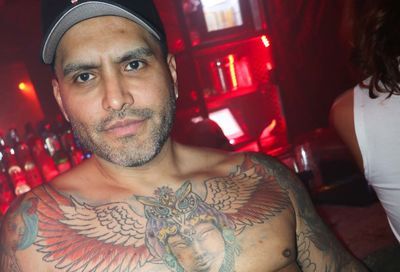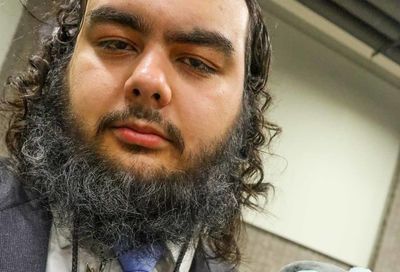Briefs urge Supreme Court to oppose baker’s request to refuse service
Supporters of LGBTQ equality argue the First Amendment does not justify flouting nondiscrimination laws

A host of LGBTQ groups and their allies in the political, legal, and business communities submitted a host of amicus briefs in support of Charlie Craig and Dave Mullins, a gay couple who were denied service by a local baker who opposes same-sex marriage.
Jack Phillips, the owner of Masterpiece Cakeshop in Lakewood, Colo., has appealed lower court decisions finding in favor of Craig and Mullins, arguing that his religious beliefs opposing homosexuality should be accommodated by exempting him and his business from having to adhere to Colorado’s law prohibiting discrimination against people based on their sexual orientation. In June, the U.S. Supreme Court agreed to hear the case, setting the stage for another potentially monumental LGBTQ rights decision in 2018.
The issue comes down to how both supporters and opponents of LGBTQ rights perceive the conflict between the couple and Phillips. Conservative groups, including Alliance Defending Freedom, continue to maintain that cake baking is a form of artistic expression that should be protected by the First Amendment. Thus, they argue, Phillips is not discriminating against LGBTQ people like Craig and Mullins for who they are, but rather what they might request that he do, such as incorporating a message or their names into the cake.
That argument has been adopted by the U.S. Department of Justice, which will argue on Phillips’ behalf when the Supreme Court hears the case on Dec. 5.
LGBTQ advocates, on the other hand, argue that the facts of the case are on their side: namely, that Phillips rejected the request from the couple before any message or potential designs were discussed. Additionally, they draw little or no distinction between any number of reasons why Phillips could justify his decision to refuse to serve Craig and Mullins. Thus, they argue, refusing to bake a cake based on the possibility that the cake might communicate a message of endorsement for same-sex marriage is no different than an outright refusal based on one’s sexual orientation.
The American Civil Liberties Union, the ACLU of Colorado, and the Denver law firm King & Greisen, which are representing Craig and Mullins, previously filed a brief on Oct. 23 arguing that businesses that open themselves up to the public as places of accommodation should not be able to refuse service based on a person’s identity, including characteristics such as race, religion, or sexual orientation.
“This is not about the cake. Charlie and Dave walked into the Cakeshop and were turned away for who they are,” Louise Melling, the deputy legal director of the ACLU, said in a statement issued when the brief was filed.
The ACLU has also asked the court to consider the far-reaching consequences that allowing businesses to discriminate based on religious beliefs would have on others who are not themselves LGBTQ-identifying.
In a conference call with other pro-equality groups hosted by the ACLU on Monday afternoon, John Paul Schnapper-Casteras of the NAACP Legal Defense Fund argued that the Masterpiece case is similar to the 1968 Supreme Court case Newman v. Piggie Park. In that case, the owner of a South Carolina barbecue restaurant argued his religious beliefs supporting white supremacy justify his refusal to serve African-Americans and exempted him from having to abide by laws prohibiting discrimination in placed of public accommodation.
“When [Piggie Park] ultimately reached the Supreme Court, the court unanimously held that that Piggie Park’s conduct violated civil rights laws, because, as the district court had explained, ‘the free exercise of one’s beliefs, as distinguished from the absolute right to a belief, is subject to regulation when religious acts require accommodation to a society,'” Schnapper-Casteras said. He said the NAACP Legal Defense Fund made those same arguments in its own amicus brief urging the court not to be swayed by Phillips’ appeals to the First Amendment.
Interestingly, the district court in Piggie Park made an even clearer distinction, writing: “Undoubtedly, [the business owner] has a constitutional right to espouse the religious beliefs of his own choosing; however, he does not have the absolute right to exercise and practice such beliefs in utter disregard of the clear constitutional rights of other citizens.” (Emphasis added.)
Among the various organizations submitting amicus briefs was Lambda Legal, which filed a brief along with the Family Equality Council that not only outlined legal arguments but shared stories of various forms of discrimination directed against same-sex parents and their children. For example, the brief includes the story of a married, same-sex couple who were discriminated against by several midwives, turned away from a birthing class, and later prohibited from enrolling their son in a child care facility because others cited their religious objections to same-sex marriage and child-raising.
“This is not about a cake. It is about licensing cradle-to-grave discrimination against lesbian, gay, bisexual and transgender people,” Rachel B. Tiven, the executive director of Lambda Legal, said on the ACLU conference call. Tiven said the stories compiled by Lambda Legal and Family Equality Council for the brief demonstrate how widespread and pervasive anti-LGBTQ discrimination actually is.
“Our clients, and thousands of people who contact our legal helpline desk every year, have been shunned and denied service, literally from birth to death, and everything in between,” Tiven said. “LGBT people around the country told us stories of refusal, by businesses large and small. We heard from people who were denied service at every stage of life.”
U.S. Rep. John Lewis (D-Ga.), a Civil Rights icon who served as the chairman of the Student Nonviolent Coordinating Committee and helped organize the 1963 March on Washington, was also on the call, and expressed his support for Craig and Mullins. Several of Lewis’ colleagues who are members of the LGBT Equality Caucus, are expected to announce the filing of their own amicus brief in support of nondiscrimination protections for historically marginalized groups on Wednesday.
“No American should have to endure the humiliation that Charlie Craig and Dave Mullins experienced. In this day and age, it is simply wrong for any business to discriminate based on sexual orientation,” Lewis said. “This case shows that the fight to advance our nation’s commitment to advancing the dignity and the worth of every human being is constant.
“Together, we have a mission, an obligation, and a mandate: to oppose discrimination in every form,” he added. “I have fought too long and too hard to end discrimination based on race and color not to stand up to discrimination based on sexual orientation.”
Support Metro Weekly’s Journalism
These are challenging times for news organizations. And yet it’s crucial we stay active and provide vital resources and information to both our local readers and the world. So won’t you please take a moment and consider supporting Metro Weekly with a membership? For as little as $5 a month, you can help ensure Metro Weekly magazine and MetroWeekly.com remain free, viable resources as we provide the best, most diverse, culturally-resonant LGBTQ coverage in both the D.C. region and around the world. Memberships come with exclusive perks and discounts, your own personal digital delivery of each week’s magazine (and an archive), access to our Member's Lounge when it launches this fall, and exclusive members-only items like Metro Weekly Membership Mugs and Tote Bags! Check out all our membership levels here and please join us today!

























You must be logged in to post a comment.